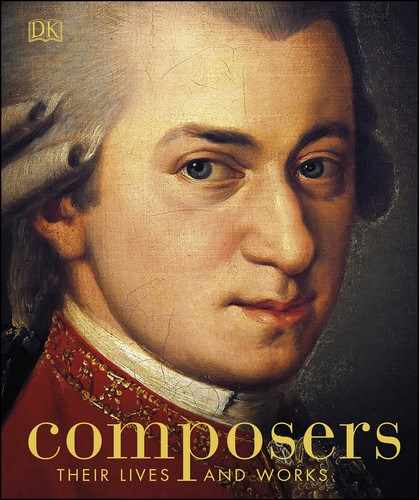Georges Bizet
1838–1875, FRENCH
Bizet’s career reads like the libretto of a tragic opera. Precociously gifted, he struggled to find fame. At the end of his life, he created Carmen, one of the world’s most popular operas, but died believing it was a failure.

GEORGES BIZET
Shown here bearded and bespectacled, Bizet died suddenly at the age of just 36, seemingly from a heart attack. He saw minimal success in his lifetime—his works generated far greater interest from the 20th century onward.
IN PROFILE
Prosper Mérimée
Mérimée (1803–1870) was a genuine polymath: a government official, man of letters, historian, and translator. In his work as the inspector-general of historical monuments, he was instrumental in founding the National Museum of the Middle Ages and restoring the citadel of Carcassonne. The Base Mérimée is the official database of French monuments. As a writer, he is best remembered as a pioneer of the novella. Published in 1845, his Carmen was based on a story told to him by the Countess of Montijo on his visit to Spain in 1830.

PORTRAIT OF PROSPER MERIMEE, SIMON ROCHART, 1852
Born in Paris, the son of a singing teacher, Georges Bizet received his early musical training from his parents and uncle, all accomplished musicians. In 1848, aged nine, he was admitted to the Paris Conservatoire and was an exceptional student, winning prizes for piano, organ, and composition.
Early breaks and interests
More importantly, Bizet found favor with Charles Gounod—20 years his senior—who became his lifelong friend and mentor. Inspired by one of the latter’s works, Bizet produced his first major composition, Symphony in C (1855), now recognized as one of his finest orchestral scores. It was never performed in his lifetime, only receiving its first public airing in 1935.
In 1857, he won the Prix de Rome, which financed his studies in Italy. Here, he soon lapsed into a bohemian lifestyle and his main musical offering at that time was the comic opera Don Procopio. This earned him disapproval from his teachers who expected a recipient of the prestigious Prix to produce a more serious work.
“ [A] beautiful art, but … a wretched profession.”
GEORGES BIZET, ON MUSIC, 1867
Bizet was a brilliant performer, but he refused to become a concert pianist. His interest lay in the theater. In this field, his first opera of real quality was The Pearl Fishers, which premiered in 1863. The public liked it, as did Berlioz, but the critics lambasted it. The show closed after 18 performances.

THE PEARL FISHERS
This is the title page of a German edition of Bizet’s first major opera, The Pearl Fishers, which tells the story of a love triangle set in a fishing village in ancient times.
Turbulent times
Bizet’s personal life was in turmoil at this time. In 1862, he fathered an illegitimate child with the family’s housekeeper, although this was hushed up (the mother only revealed the secret on her deathbed). Bizet later married Geneviève Halévy. Their union was sometimes rocky, largely due to the interference of Geneviève’s mother, who was mentally unstable.
Meanwhile, his career was stalling. He was burdened with hack work—producing piano transcriptions, creating a piano course for children, and helping other composers. His own compositions were often rushed or abandoned for lack of time. Carmen (1875) should have changed all that. Based on Prosper Mérimée’s powerful novella (see box), it had hot-blooded characters, Spanish and Romany rhythms, and the mercurial Célestine Galli-Marié singing the lead. Yet Bizet’s opera shocked Parisian audiences, who were appalled by the rawness of the passions, the on-stage murder of Carmen by her jealous ex-lover Don José, and scenes in which women smoked. Because it had spoken dialogue rather than recitative, it was staged at the Opéra-Comique, which normally hosted more gentle productions. Nonetheless, Bizet’s masterpiece has become one of the world’s most popular operas. With its brutal plot and passionate characters, it went on to influence the verismo (realism) movement.

GALLI-MARIE AS CARMEN
Henri Lucien Doucet here depicts Célestine Galli-Marié in Spanish attire as the heroine in the title role of Bizet’s thrilling opera Carmen. Audiences were outraged by the work’s passion and violence when it premiered in 1875.
